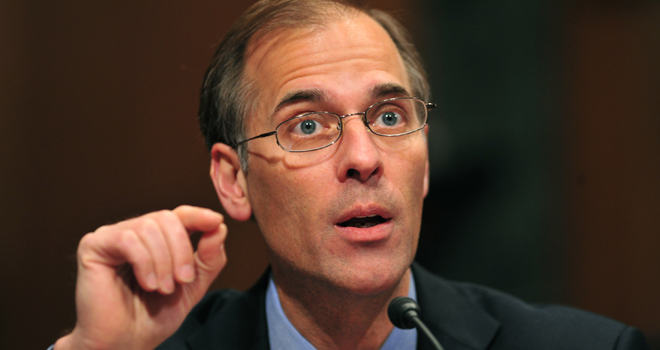Former McCain economic adviser, and longtime stimulus defender, Mark Zandi took issue today with House Minority Leader John Boehner’s criticisms of President Obama’s economic policies, and with multiple GOP calls for Obama’s top economic advisers to resign.
“I think we’d be in a measurably worse place if not for the stimulus,” Zandi said at the Christian Science Monitor breakfast this morning. “If we had not had the stimulus…we’d have fewer jobs today than we actually have.”
Zandi was responding to Boehner’s contention yesterday that stimulus spending “has gotten us nowhere.” Asked whether he agreed with Boehner, Zandi said “no.”
“Without the stimulus spending,” Zandi insisted, “instead of a 9.5 percent unemployment rate, we’d have an 11.5 percent unemployment rate.”
Zandi also defended the performance of Treasury Secretary Timothy Geithner and Obama’s Chief Economic Adviser Larry Summers, both of whom have been called upon by leading Republicans to resign.
“I think that, in totality, the policy response [from Geithner and Summers] has been excellent. That it was very aggressive and ultimately very successful, so I give them high marks. Any individual aspect of the policy response one could debate… broadly speaking I think it was very effective.”
Zandi took particular issue with the size of the stimulus. He says it should have been larger, with more money dedicated to tax incentives to small businesses and less to infrastructure spending. More infrastructure spending, he said, “would have enormous productivity benefits,” but is necessarily stimulative in the near-term.
“I would have made it larger,” Zandi said. “I think we underestimated — significantly underestimated — the severity of the situation that we were in and still are in. And that that would have argued for a larger stimulus package.”
Those failings, though, were a fault of the political process. According to Zandi, “The most important criteria for the stimulus passage in that time was getting it done fast, because the economy was going down fast…. They had to make compromises to get it through the Senate…and part of that compromise was adding to the infrastructure spending.”
Zandi holds out little hope for more stimulative spending at this point, even though the economy is on the brink of a double-dip recession.
It’s very difficult to envisage any significant policy response to current economic problems in the near term,” he said.










